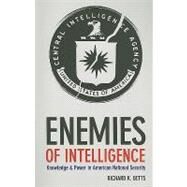Enemies of Intelligence : Knowledge and Power in American National Security
, by Betts, Richard K.- ISBN: 9780231138895 | 023113889X
- Cover: Paperback
- Copyright: 3/1/2009
The tragic events of September 11, 2001, and the false assessment ofSaddam Hussein's weapons arsenal were terrible reminders that good information isessential to national security. These failures convinced the American public thattheir intelligence system was broken and prompted a radical reorganization ofagencies and personnel, but as Richard K. Betts argues in this book, critics andpoliticians have severely underestimated the obstacles to true reform.One of the nation's foremost political scientists, Betts drawson three decades of work within the U.S. intelligence community to illuminate theparadoxes and problems that frustrate the intelligence process. Unlike America'sefforts to improve its defenses against natural disasters, strengthening itsstrategic assessment capabilities means outwitting crafty enemies who operate beyondU.S. borders. It also requires looking within to the organizational and politicaldynamics of collecting information and determining its implications for policy.Combining academic research with personal experience, Bettsoutlines strategies for better intelligence gathering and assessment. He describeshow fixing one malfunction can create another; in what ways expertise can be both avital tool and a source of error and misjudgment; the pitfalls of always strivingfor accuracy in intelligence, which in some cases can render it worthless; thedanger, though unavoidable, of "politicizing" intelligence; and the issue ofsecrecy& -when it is excessive, when it is insufficient, and howlimiting privacy can in fact protect civil liberties.Bettsargues that when it comes to intelligence, citizens and politicians should focusless on consistent solutions and more on achieving a delicate balance betweenconflicting requirements. He also emphasizes the substantial success of theintelligence community, despite its well-publicized blunders, and highlightselements of the intelligence process that need preservation and protection. Manyreformers are quick to respond to scandals and failures without detailed, historicalknowledge of how the system works. Grounding his arguments in extensive theory andpolicy analysis, Betts takes a comprehensive and realistic look at how knowledge andpower can work together to face the intelligence challenges of the twenty-firstcentury.






